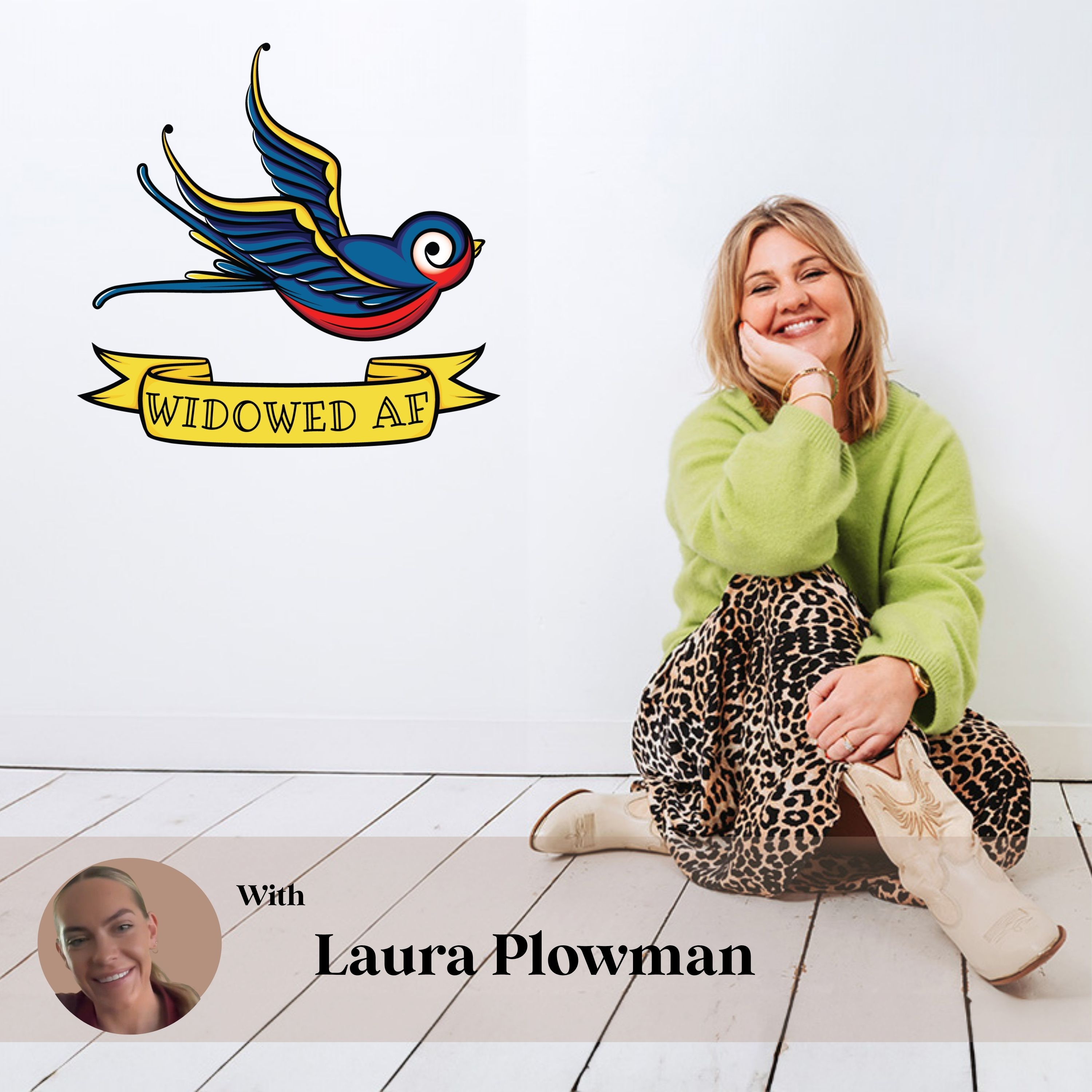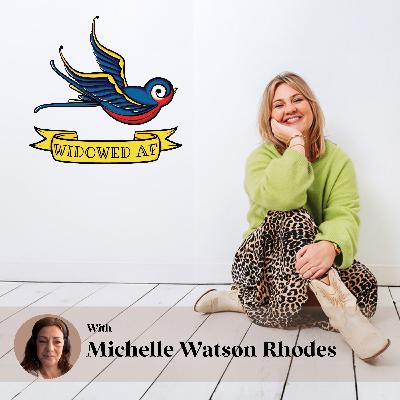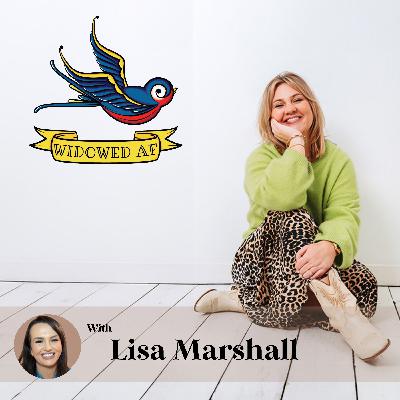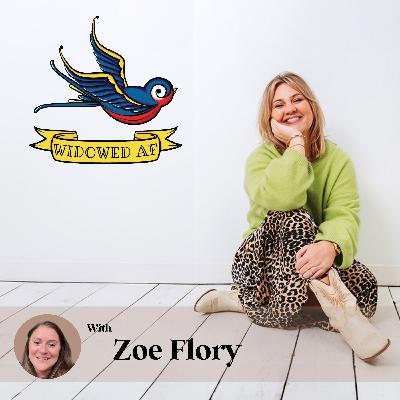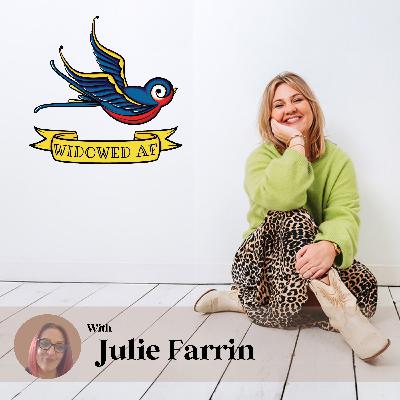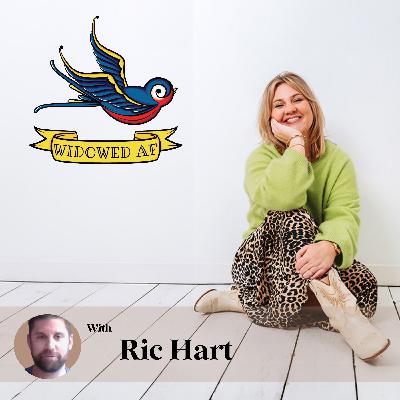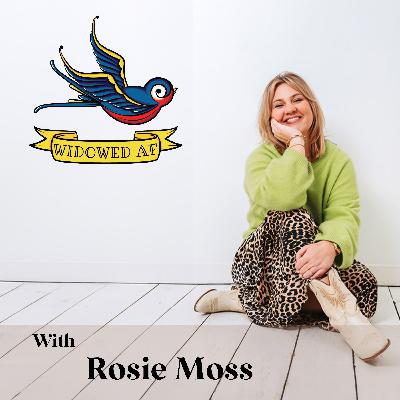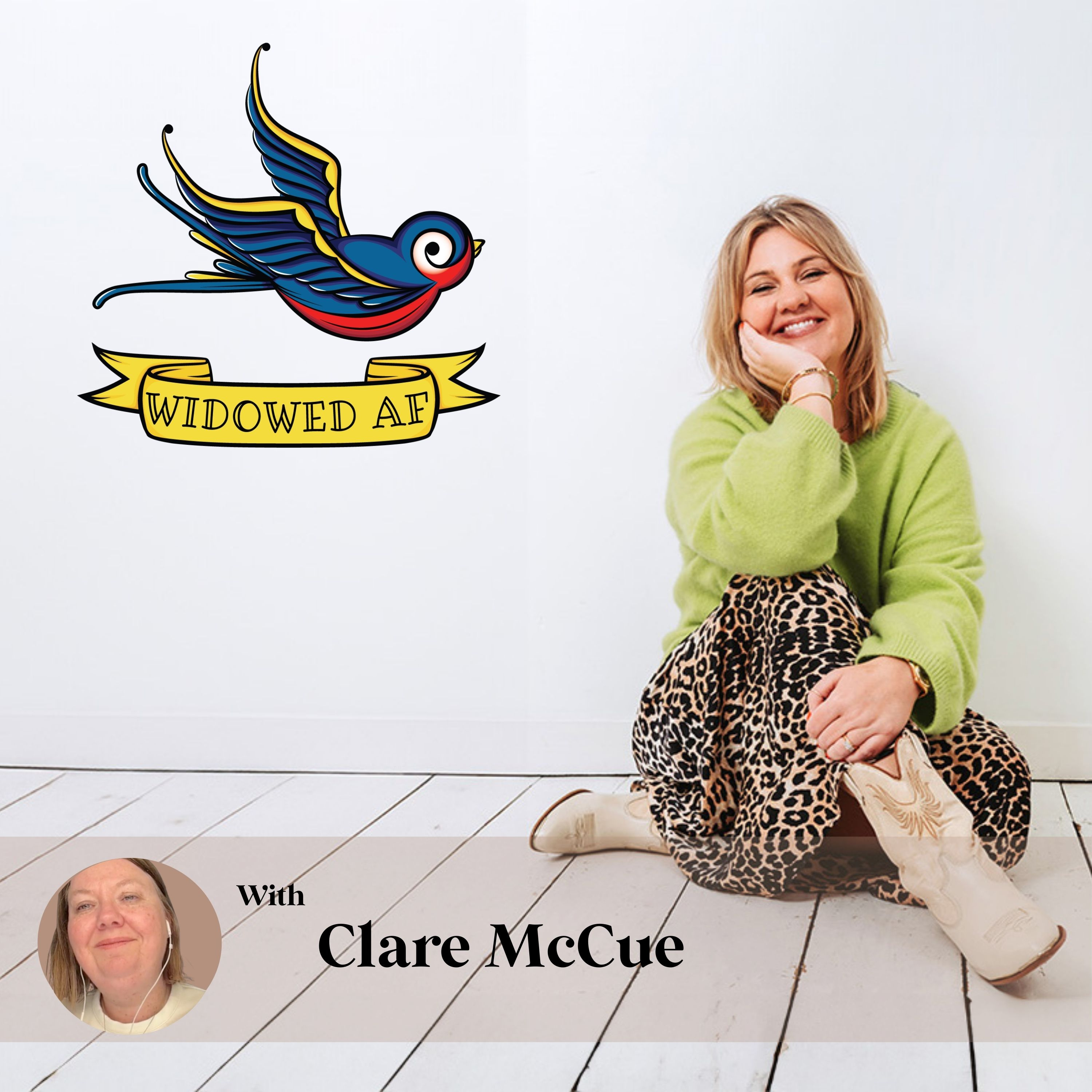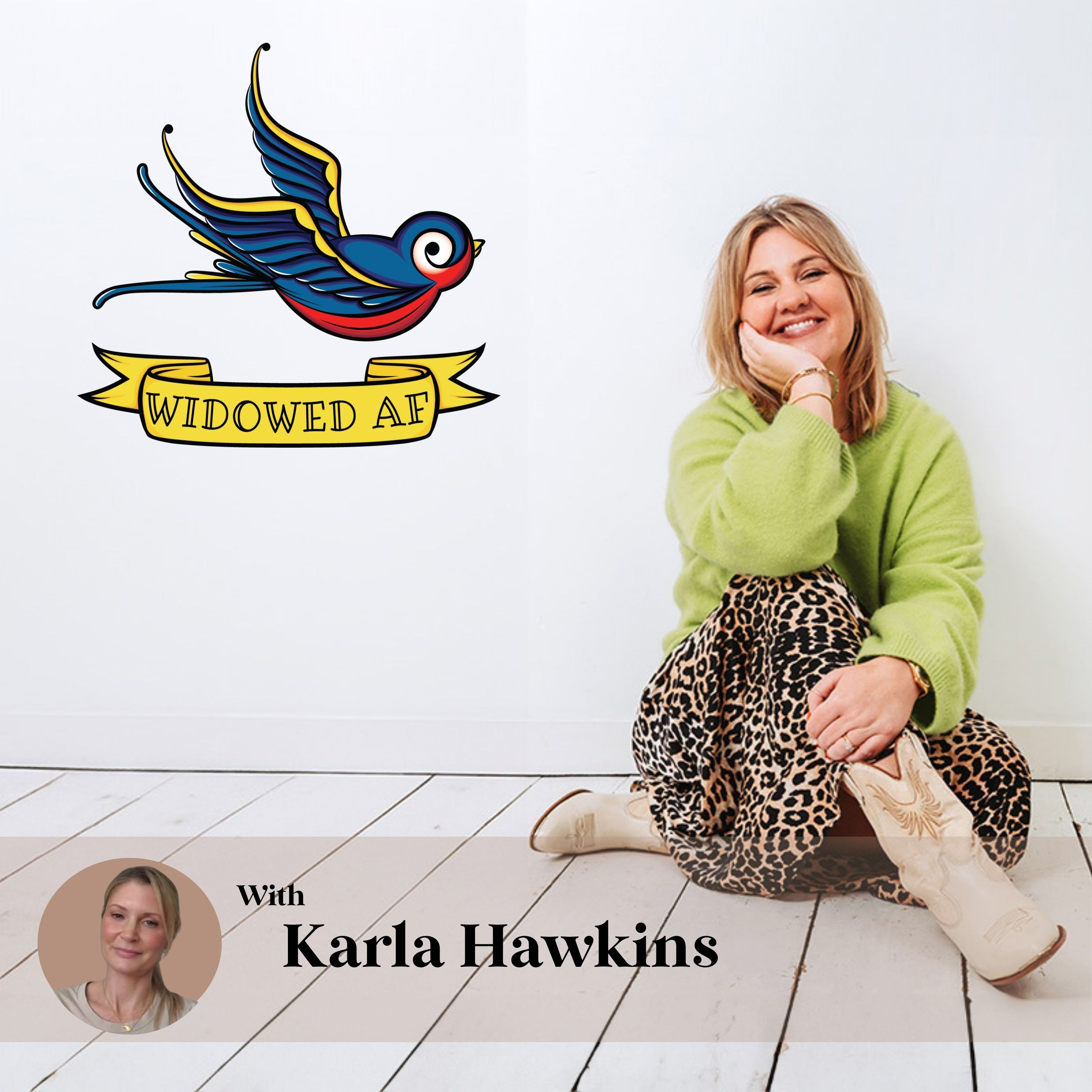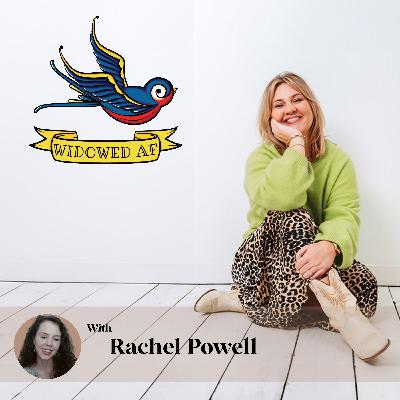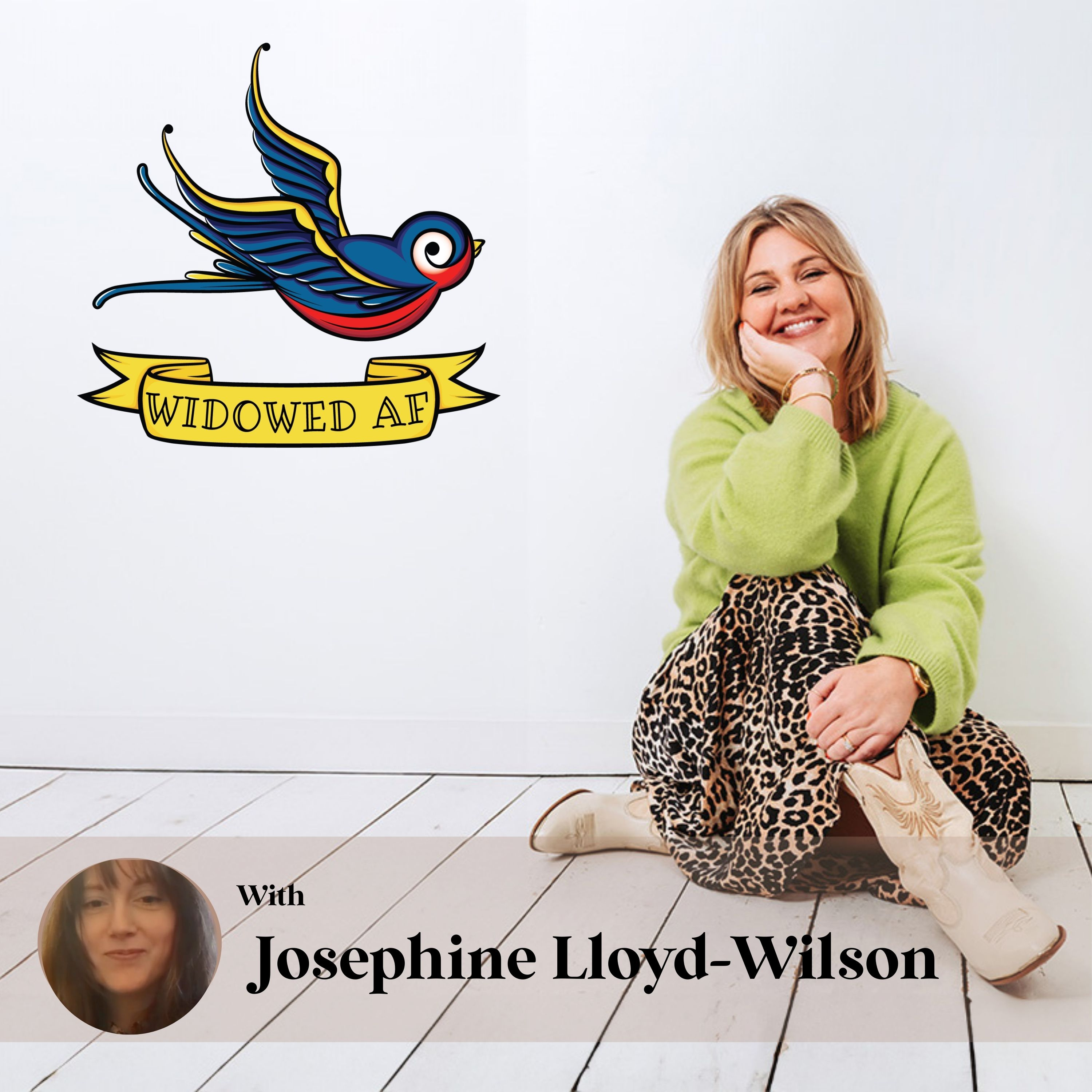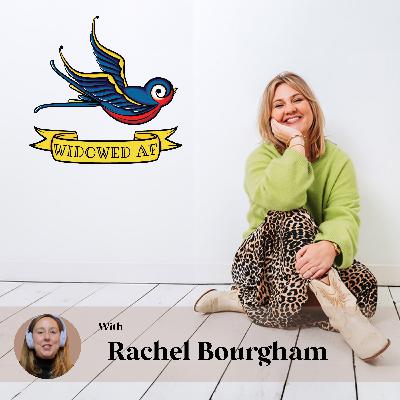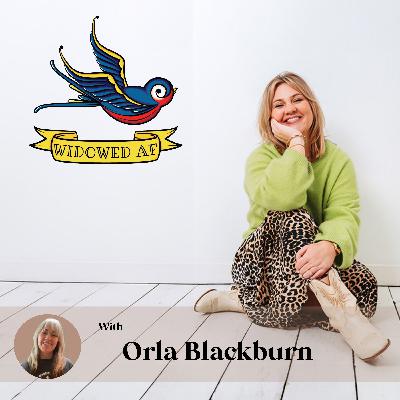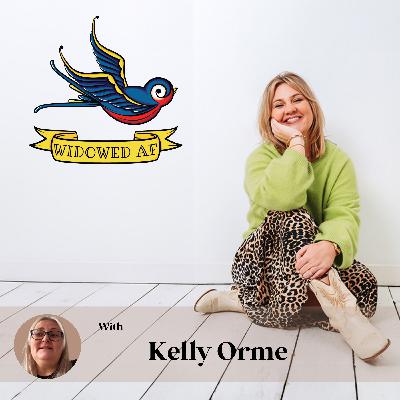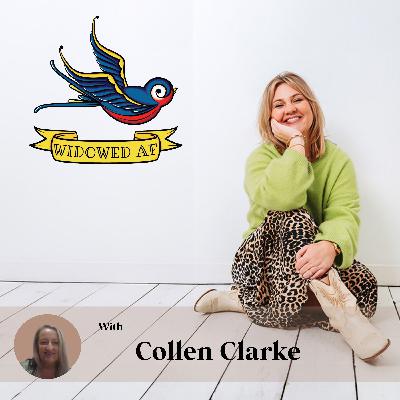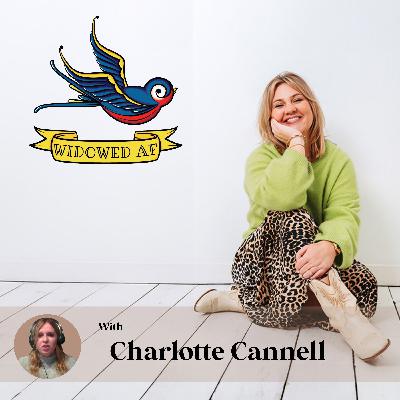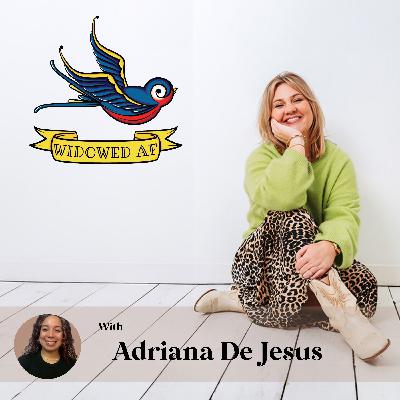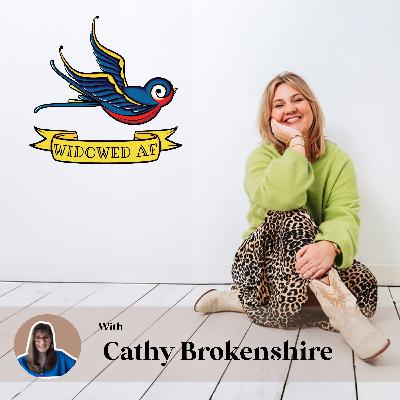Discover Widowed AF: Real stories of love, grief and beyond - With Rosie Moss
Widowed AF: Real stories of love, grief and beyond - With Rosie Moss

Widowed AF: Real stories of love, grief and beyond - With Rosie Moss
Author: Rosie Moss
Subscribed: 40Played: 2,101Subscribe
Share
© Rosie Moss
Description
British Podcast Awards 2025 - Winner.
In 2018, Rosie Moss lost her husband Ben in a diving accident, leaving her widowed at 37 with three children. Finding grief resources shallow and platitudes empty, she created Widowed AF—a podcast offering honest conversations about loss. Through guest stories and expert advice, the show covers practical challenges (finances, single parenting) and emotional realities (anger, loneliness, joy). From processing her own grief to building a global community, Rosie helps others feel less alone. The podcast provides tools and shared experiences for rebuilding life after loss.
In 2018, Rosie Moss lost her husband Ben in a diving accident, leaving her widowed at 37 with three children. Finding grief resources shallow and platitudes empty, she created Widowed AF—a podcast offering honest conversations about loss. Through guest stories and expert advice, the show covers practical challenges (finances, single parenting) and emotional realities (anger, loneliness, joy). From processing her own grief to building a global community, Rosie helps others feel less alone. The podcast provides tools and shared experiences for rebuilding life after loss.
157 Episodes
Reverse
When Mat Owen lost his wife Nic to breast cancer in 2023, his world was turned upside down. Left to raise their two young children, he faced the unimaginable: grieving the love of his life while trying to stay present as a father.In this powerful and deeply human conversation, Rosie and Mat explore what it means to parent through loss, love someone through illness, and rebuild life when the person who anchored you is gone. Mat speaks with raw honesty about emotional shutdown, male grief, and the isolation that often comes with being a widowed dad. He shares the highs and heartbreak of his life with Nic, from meeting in their teens to defying medical odds to become parents, and the quiet strength she showed throughout her cancer journey.Together, they reflect on the small, everyday moments that carry enormous weight: bedtime routines, school WhatsApp threads, a child’s comment about a photo, and the instant you realise your daughter looks just like her mum. The episode also delves into coping after loss, from alcohol use to dating apps, and the difficult but hopeful path toward self-compassion and sobriety.This is a conversation about love that refuses to fade, the legacy of a mother’s strength, and the courage it takes to keep showing up. Mat’s story is a reminder that even in the depths of grief, we can find purpose, connection, and hope.Episode highlights:• Mat reflects on meeting Nic in his early twenties and how her strength and clarity brought purpose and love into his life.• They navigate the shock of a cancer diagnosis in 2011, a relationship tested through treatment, and their fierce determination to become parents against medical predictions.• Mat discusses the return of Nic’s cancer after the birth of their second child, the emotional strain it brought, and Nic’s unwavering resilience through her final years.• Together, they confront male emotional reticence in grief and the unexpected difficulty of building support networks as a widowed father.• Mat shares how he and Nic co-created child-friendly bereavement tools, “cancer flashcards,” and how he now carries that legacy forward. https://www.littlecclub.com/shop• The conversation explores coping mechanisms after loss, from alcohol use to dating apps, and the difficult but hopeful path toward sobriety and reconnection.• Parenting after loss is shown in touching detail, from school run routines to gently helping children navigate insensitive playground remarks.• They close on how grief reshapes identity, the quiet pride Mat finds in being “the school mum,” and the presence of Nic in the children she left behind.
In this episode Rosie Moss speaks with Laura Plowman, who lost her partner Gavin to terminal cancer just months after the birth of their son. A former police officer, Laura shares her journey of love, loss and survival with breathtaking honesty and quiet strength.Laura and Gavin met through work in 2018, their relationship moving quickly from first dates to buying a home and welcoming a baby in June 2020. But their new family life was abruptly upended when Gavin collapsed in their garden and was diagnosed with an aggressive spinal tumour. Just five weeks after symptoms began, doctors told them his cancer was incurable, with a prognosis of only 12 to 18 months.Laura describes becoming both a new mother and a caregiver to her paralysed husband. She shares tender and painful memories: their backyard wedding, Gavin’s choice to stop chemotherapy in favour of quality time, his voice notes recorded for their son, and the mixture of dark humour and fragile intimacy that helped them endure. “It was beautiful, yet horrendous, yet unfair,” Laura reflects of Gavin’s final hours, a line that captures the raw and contradictory landscape of this conversation.Now parenting their child alone, Laura speaks about helping him grieve a father he will never truly know, rediscovering moments of joy, and leaning on therapy, music and widow communities for strength. Her story is devastating and hopeful, full of love, loss and the small ways life carries on.This conversation explores:Laura’s whirlwind love story with Gavin, from awkward first impression to cohabitation, engagement and parenthoodThe devastating collapse in the garden that led to a terminal diagnosis five weeks laterBalancing medical treatment with quality of life as Gavin chose to end chemotherapyFragile and intimate moments: a backyard wedding, shared hospital jokes and voice notes for their baby sonFacing death together, from syringe drivers to spirituality to Gavin’s final hoursNavigating solo parenting and helping a young child grieve a parent they will never fully knowRediscovering life through therapy, music and widow support communities where grief and laughter coexist
Rosie speaks to Michelle Watson Rhodes, who shares the devastating story of losing her fiancé Mike to a sudden heart attack just six months before their planned wedding.Michelle and Mike’s love story began during the stillness of lockdown, unfolding through long walks, shared breakfasts and the kind of everyday companionship that makes life feel steady. A quiet proposal by the river led to plans for a wedding in Jamaica until everything changed in a single night.Michelle reflects on the night she lost Mike, the desperate attempt at CPR and the unimaginable aftermath of being treated as a suspect, facing hostility from an estranged family and fighting to be recognised in her grief.She also shares how she holds onto Mike’s legacy, the man who once saved a stranger’s life and was honoured with an MBE, while slowly rebuilding her world with quiet courage and small rituals that help her keep going.This conversation is about love interrupted, grief without recognition and the resilience it takes to keep moving forward when everything has changed.
In this episode Rosie Moss speaks with Lisa Marshall, known online as @the_widowdiaries on Instagram and TikTok. Lisa has built a powerful community by sharing her journey of surviving the sudden suicide of her husband Alan and raising three young children in the aftermath.Through raw honesty and reflection, Lisa opens up about the shock of widowhood, the silence that often surrounds suicide, and the everyday reality of parenting through unimaginable grief. From breaking the news to her children, to navigating their neurodivergent needs, to finding fleeting signs of comfort in ladybirds and flickering lights, she offers a candid and unflinching account of resilience, love, and survival.This conversation explores:The shock of suicide and the unanswered questions it leaves behindParenting as a widow compared with single parenting after separationExplaining suicide to children with honesty and compassionThe weight of public expectations and private griefFinding meaning in small signs, stories, and shared communityThis episode is a moving reminder that grief lives in school runs, packed lunches, and the quiet work of staying present for those still here.
In this episode Rosie Moss is joined by Zoe Flory, who shares the story of her late partner Patrick from their whirlwind first meeting in a Brighton pub to navigating his terminal cancer diagnosis to raising their daughter Addie after his death.With unflinching honesty and flashes of humour, Zoe speaks about the reality of becoming a full-time caregiver, the heartbreak of watching Patrick fade under the weight of cancer and Lynch syndrome, and the extraordinary tenderness that carried them through.Zoe recalls the messy, magical, and devastating moments: draining fluid from Patrick’s lungs at home, creating “daddy magic” rituals for their toddler, and choosing a pub-style wake over the cremation she wasn’t ready for. She talks openly about preparing a young child for loss, using imaginative metaphors like “Daddy lives on the moon” to help Addie find comfort.Now living in a platonic co-parenting arrangement with a close friend, Zoe reflects on parenting through grief, reclaiming her own identity, and the contradictions of widowhood where love, loss, exhaustion and laughter all collide.This conversation is a reminder that grief is never simple, caregiving is never easy, and yet new forms of family and meaning can grow in the wake of heartbreak.
In this episode Rosie Moss speaks with Julie Farrin, who lost her husband Andy to glioblastoma, an aggressive and fast moving brain cancer.Julie shares the story of meeting Andy, falling for his quiet kindness, and marrying him just weeks before their world was turned upside down. She talks about the first seizure that led to his diagnosis, the challenges of treatment during lockdown, and the painful reality of watching his words, independence and dignity slip away.Together we explore what it meant to become a full time carer so early in marriage, the mix of exhaustion and dark humour that carried her through, and the heartbreak of hospice and widowhood. Julie also reflects on life after Andy, returning to work too soon, panic attacks, health struggles of her own, and the slow work of building a life without him.She is honest about the isolation, the decisions she never thought she would face, and the importance of keeping Andy’s memory alive. As Julie puts it, “We are the gatekeepers, the memory keepers.”We talk about:• Julie and Andy’s love story and the early signs of glioblastoma• The impact of lockdown on treatment and caregiving• Watching decline up close and making end of life decisions• The burden of being the only caregiver and managing others’ denial• Choosing not to pursue motherhood under impossible circumstances• Returning to work, health struggles and the ongoing reality of grief• Why storytelling matters and how memory keeping keeps loved ones close
In this episode, host Rosie Moss speaks with Ric Hart—a writer, speaker, and solo father who lost his wife Jade shortly after the birth of their son Hugo in 2018.Ric shares the raw reality of grief colliding with fatherhood: bringing a newborn home alone, feeding Hugo through sleepless nights, and confronting what he believes were preventable hospital failures. From that devastation, he found purpose—writing children’s books that comfort his son, publishing an adult memoir, and creating a podcast and nonprofit work to support other grieving families.He also opens up about how contrast therapy—a mix of sauna and ice baths—helped him regulate his nervous system and eventually became a practice he now shares with others.Together, Rosie and Ric explore:The trauma of losing Jade during childbirth and the isolating experience of widowed fatherhood.How Ric broke time into “hour-by-hour” survival to keep going in those first months.The role of writing, storytelling, and advocacy in transforming grief into purpose.The social isolation of being a widowed dad in mother-centric parenting spaces.Rebuilding identity through contrast therapy and creating a coaching practice.Dating after profound loss and finding space for new love alongside eternal grief.Practical advice for anyone grieving: take small steps, let yourself feel, and lean on the people who truly show up.As Ric says, it’s about “just turning up”—for your children, for yourself, and for others walking the same path.
In this solo episode, host Rosie Moss shares her own story with unflinching honesty.Seven and a half years after losing her husband, Rosie now faces a second upheaval: the end of her marriage. She reflects on how new heartbreak can reawaken old wounds, leaving her once again asking, how the f**k do I get back up?Rosie talks candidly about raising three children, two with additional needs, while navigating school moves, GCSE pressure, and the relentlessness of being the only adult her kids can lean on. She admits to feeling exhausted, isolated, and often overwhelmed, but also determined to keep going.Amid the chaos, she finds moments of light:Finishing her first book on widowhood.Hosting her debut Widowed AF retreat, a space for connection and healing.Being named a finalist at the British Podcast Awards, a reminder that her work matters.This is an episode about overlapping griefs, solo parenting, and starting again when you didn’t think you had the strength. With dark humour, humility, and fierce honesty, Rosie invites you into her world, proof that even in the wreckage, there can still be community, meaning, and hope.
In this episode, Rosie Moss sits down with Clare McCue, who faced one of the most difficult journeys imaginable: walking with her husband Mattie through ALS, and ultimately supporting his decision to die with dignity through Canada’s medical assistance in dying (MAiD) law.Clare shares candidly what it meant to prepare her young son Hudson for his father’s death — not by hiding it, but by weaving him into every stage of the process. From navigating a chaotic healthcare system during lockdown, to explaining assisted dying with honesty and compassion, Clare opens a window onto the realities few families ever speak of.The conversation explores:The emotional, legal and practical steps of pursuing assisted death in Canada.How Clare and Mattie made space for dignity and agency, even in decline.The raw reality of telling a child that his father had chosen the time and place of his death.How organ donation added a powerful sense of legacy to Mattie’s final act.The ways Clare turned grief into action through community fundraising and everyday rituals with Hudson.As Clare says, “Hope wasn’t that everything would be okay, but that there would be meaning in how it worked out.”This is an extraordinary story of love, courage, and the controversial but profoundly human choice of assisted death.
At just 31, Karla Hawkins’ husband Dan was diagnosed with stage four bladder cancer. Overnight, life became a whirlwind of surgeries, drug trials, and caregiving — all while trying to hold onto hope.In this moving episode, Karla shares: • The shock of a rare diagnosis in young adulthood • Becoming a full-time caregiver while balancing work and finances • The phone call that told her Dan had just one week to live • Their last-minute wedding in his father’s garden before hospice care • The decision not to use Dan’s stored sperm after his death • How she rebuilt her life while keeping Dan’s memory visibleThis is a story about love, logistics, loss — and the impossible choices we make when time runs out.
In this episode, Rosie Moss speaks with Rachel Powell, who lost her husband Andre to suicide after years of battling undiagnosed depression, sex addiction, and harmful church dynamics.Rachel opens up about the reality of living in a marriage marked by broken boundaries, secrecy, and the crushing weight of spiritual control. She explains how her attempts to set a safety plan were met with resistance, and how guilt, silence, and church pressures compounded the crisis that ended in Andre’s death.We talk about: • The intersection of addiction, mental health & faith communities • Surviving suicide loss while raising children and adopted relatives • Leaving unsafe faith spaces to protect her daughters • The judgement she faced from family and church members • Her journey through suicidal thoughts, therapy, and rebuilding identity • Founding Hope Speaker to support others affected by suicide and lossRachel’s story is one of unflinching honesty, deep pain, and incredible resilience. She shares how honesty with her children about their father’s death has opened a path toward healing, and how community, therapy, and a safer faith space have helped her reclaim her life.This is an episode about truth-telling, survival, and the strength it takes to rebuild when the systems meant to support you instead cause harm.More information about Rachel Powell can be found here www.hopespeaker.com/coaching#WidowedAF #GriefSupport #SuicideLoss #SpiritualAbuse #FaithTrauma #ParentingThroughGrief #SoloParenting #MentalHealthAwareness #ReligiousTrauma #GriefJourney #HopeAfterLoss #Widowhood #LifeAfterSuicide #AddictionRecovery #SuicideBereavement #GriefPodcast
In this episode, Rosie Gill-Moss speaks with musician Sephine Llo (Josie) about love, loss, and the complicated road to motherhood after bereavement.Josie married fellow musician Rob just days after his stage-four cancer diagnosis. Over the next two years, they endured 30 rounds of chemotherapy, multiple surgeries, and the looming reality of terminal illness—all while clinging to hope and planning for a family. Before treatment began, they froze embryos, a decision that would shape Josie’s life long after Rob’s death.When Rob died in hospice care, Josie was carrying their son Laurie. Years later, she returned to those frozen embryos to conceive their daughter, Connie. Now a solo parent of two, she speaks with raw honesty about postpartum depression, the judgement she faced for using embryos after loss, and the daily work of raising children who will only ever know their dad through photographs and recordings.Music threads through it all. For years Josie couldn’t write a song, until she found Rob’s unfinished demos and turned them into Diamond Fall—a posthumous album released on what would have been their tenth anniversary. She describes it as a conversation with Rob, and a way to keep his voice alive for their children.This conversation touches on:Managing illness, work, and finances as cancer takes over a householdIVF after bereavement and the emotions of parenting children conceived with a late partnerThe silences of grief: “I didn’t laugh for years”Dating again after monumental lossContent warning: Includes discussion of terminal cancer, IVF after partner death, hospice care, suicidal thoughts, and solo parent grief.If you’re a solo parent, bereaved partner, or navigating medically complex grief, Josie’s story may resonate—and remind you you’re not alone.
In this episode of Widowed AF, Rosie Gill-Moss speaks with writer and journalist Rachel Bourgham, author of Widow Land. Rachel’s world changed in an instant when her husband, Colin, was killed in a cycling accident just blocks from their home. What followed was the brutal reality of sudden loss: raising a nine-year-old alone, navigating paperwork and blame, and trying to make sense of a future she never asked for.Rachel talks openly about the strange mix of grief and survival—the shock, the humour that creeps in at the darkest times, and the moments of anger and tenderness that come with parenting through loss. She also shares how writing became her lifeline, and how love found its way back into her life without erasing the past.This conversation is honest, unpolished, and deeply human. If you’ve ever wondered how to survive when the ground shifts beneath you, this episode is for you.#WidowedAF #GriefJourney #SuddenLoss #WidowSupport #ParentingThroughLoss #LoveAfterLoss #GriefAndHealing #WidowsOfInstagram #LifeAfterLoss #GriefPodcast #HopeAfterGrief #YouAreNotAlone
In this episode, Rosie speaks to guest host Orla Blackburn—a self-proclaimed “feckless” adult whose life veered sharply off course after losing her partner, Andy, to cancer. What follows is a no-holds-barred conversation packed with bruising honesty, dry humour, and the kind of emotional realness that defines Widowed AF.Orla doesn’t sugar-coat a thing—from cheap wine in foreign campsites to the relentless slog of diagnoses, impossible medical decisions, and the numbing admin of death. She lays bare the daily grind of solo parenting a neurodivergent son, the silence that follows undelivered casseroles, and the deep loneliness that creeps in once the world moves on.Together, Rosie and Orla navigate the mess of grief: a care system that fumbles the dying, the emotional landmines of funerals and family rifts, and the jaw-clenching terror of financial freefall. But amid the chaos, there’s also resilience—and even absurdity. Orla shares how tear-streaked yoga classes became her unlikely sanctuary, and how new routines, messy reinvention, and a raw, unfiltered widowed community helped her start to rebuild.There’s hope in here too—fierce, practical optimism for anyone parenting through loss.If this episode resonates, you’re not alone. Subscribe, share it with someone in the trenches, or just take a breath. We’re all muddling through—one step, one form, one funeral at a time.
In this episode, Rosie sits down with Kelly Orme for an achingly honest conversation about surviving sudden loss, parenting through heartbreak, and building a new life from the ashes. Kelly found herself widowed in 2021 after her husband Nick died unexpectedly from an undiagnosed heart condition. With her trademark warmth, Rosie lets Kelly take the lead, sharing how she and Nick met as teenagers, built a life together in Sheffield, and weathered years of ups and downs—including other family tragedies—before everything changed overnight. Kelly details the wrenching day her daughter Holly found Nick and how grief ricocheted through their small family. The episode wrestles with the shock waves of sudden death, the messy admin and practical hurdles that come with it (spoiler: there's nothing fair about frozen bank accounts and endless forms), and how grief seeps into the daily grind—school runs, food shops, and negotiating new routines.Rosie and Kelly don’t shy away from the tough stuff. They get into the guilt and the “what-ifs,” how trauma rewires your brain, and the way friendships and community can either buoy you or fall away. Parenting when your own world has collapsed is front and centre, with real talk about supporting a grieving teenager through unreliable mental health services and the weight of unanswered questions. Kelly shares how genetic testing has added complexity, and how both she and Holly have struggled—and grown—through it all.But it’s not all bleak. There’s plenty of dry humour, a few wobbly laughs, and real hope: from Holly’s small triumphs to forging new traditions together and daring to take holidays again. Kelly’s story is a raw, relatable mix of pain, resilience, and the kind of fierce love that refuses to give up. Whether you’re newly grieving or finding your way years in, you’ll find solidarity, understanding, and maybe a bit of comfort in these honest moments.If you felt seen by today’s episode, you’re not alone. Keep on keeping on—one slow step at a time.
In this episode, Rosie Gill-Moss speaks with Colleen Clarke, a widow from Australia who shares her deeply personal story of losing her husband Steve to motor neurone disease (MND). Through a candid and honest conversation, they explore the realities of caregiving, the emotional toll of terminal illness, and the resilience required to parent a young child while facing unimaginable loss. This powerful episode touches on motor neurone disease, grief, widowhood, parenting through terminal illness, and the long arc of healing.Colleen and Steve met as teenagers and spent over three decades together. Their love story, which began with a pub dance and grew through years of shared life, took a devastating turn when Steve was diagnosed with MND—also known as ALS. Colleen recounts how the illness slowly robbed Steve of his ability to speak and move, and how she shifted from being his partner to his primary carer. She explains the uncertainty that surrounds MND diagnosis, the slow progression of symptoms, and how the family held on to normality for their daughter, Sarah, for as long as possible.Listeners hear how Sarah was conceived after years of IVF and a surprising encounter with Brazilian jungle herbs—an unexpected yet joyful part of Colleen’s story. But the joy of becoming a mother was followed just five years later by the slow, cruel advance of MND. Colleen explains the emotional and logistical challenges that came with managing a terminal illness at home: palliative care planning, home adaptations, medical equipment, and navigating grief in real-time. Her experience highlights just how fragmented the support system can be, but also shows the difference strong community networks and dedicated carers can make.As Steve’s health declined over three years, Colleen found strength in peer support, online communities, and palliative care teams who helped maintain his comfort and dignity. She also reflects on the communication barriers that emerged as Steve lost his ability to speak and how they found new ways to stay emotionally connected—including using an alphabet board and pre-recorded messages. Her story underscores the emotional complexity of being both wife and caregiver and the internal conflict that arises when love and duty become indistinguishable.Colleen also shares the impact Steve’s death had on Sarah, who was just eight at the time. They discuss the delicate balance of protecting a child while being honest, and how Sarah eventually returned to education after years of disengagement. Now 18, Sarah is pursuing a degree in film and media—testament to her strength and the care her mother put into helping her navigate grief on her own terms.This conversation offers rare insight into life with MND and the long road of widowhood that follows. Colleen’s story is a vivid account of emotional survival, practical adaptation, and the enduring strength of mother-daughter connection. Her openness about depression, the challenges of solo parenting, and her cautious optimism for the future provides real-world understanding for anyone dealing with terminal illness, bereavement, or solo motherhood.Key takeaways from this episode include the unpredictable progression of motor neurone disease, the importance of early palliative care involvement, the hidden toll on carers, and how children experience grief differently. It’s also a testament to how human connection—through peer support groups, counselling, and shared experience—can anchor someone through the darkest seasons of life.Whether you’re supporting someone through illness, grieving a partner, or parenting alone, Colleen’s story will stay with you long after the episode ends.
In this episode, Rosie Gill-Moss speaks with Charlotte Cannell about losing her fiancé Craig to a brain aneurysm when she was just 27 years old. Their conversation explores the devastating impact of sudden loss on a young woman who had been with her partner since she was 16, and how she rebuilt her life through travel, family support, and finding new purpose.Charlotte shares the harrowing twelve days she spent by Craig's bedside in intensive care after he collapsed during a council meeting in November 2020. Despite initial hope when he regained consciousness and recognised her, complications including sepsis ultimately led to his death. The discussion delves into the unique challenges facing young widows, particularly those without children. Charlotte candidly explores grieving not just Craig, but the future they had planned together - their wedding booked for July 2023, the children they hoped to have, and the life they were building in Essex. Her decision to legally take Craig's surname through deed poll, despite never marrying, demonstrates the depth of their bond and her determination to honour their relationship.
In this episode, Rosie Gill-Moss speaks with Adriana De Jesus, a young widow from New York state who lost her husband Jason to a fatal asthma attack when their son was just 14 months old. This powerful conversation explores the devastating reality of sudden widowhood, the challenges of single parenting after loss, and the unexpected journey of finding meaning through grief.Adriana shares her love story with Jason, beginning at a soundstage studio in 2018 where their 15-year age gap didn't prevent an instant connection. Their relationship accelerated during the 2020 lockdown, leading to parenthood and what seemed like a bright future together. However, in June 2023, Jason's routine seasonal asthma took a fatal turn, possibly exacerbated by poor air quality from Canadian wildfires. Despite having managed his condition his entire life, Jason died from an asthma attack at home, leaving Adriana to navigate sudden widowhood at just 28 years old.The conversation delves into the immediate aftermath of loss, including the trauma of performing CPR, arriving at the hospital with her infant son, and learning her partner hadn't survived. Adriana candidly discusses the guilt she felt about finally getting sleep after months of exhaustion with a newborn, only to lose Jason just as life was settling into a rhythm. She reveals the financial and legal complications of being engaged but not married in New York state, where common law marriages aren't recognised, creating additional stress during an already overwhelming time.What makes this episode particularly valuable is Adriana's honest exploration of grief's complexities. She discusses discovering both her and Jason likely had undiagnosed ADHD, which affected their relationship dynamics and her postpartum experience. The episode also touches on her unique healing journey, including her decision to train as a medium after a transformative reading that helped her process Jason's death. This unexpected path has allowed her to support other grieving individuals while maintaining her connection to Jason.For parents concerned about asthma, Adriana offers perspective on managing fear after loss. When her son Parker was diagnosed with asthma, she drew strength from Jason's attitude about not letting the condition limit his life. She emphasises the importance of proper diagnosis, medication management, and understanding environmental triggers like air quality alerts. Her approach to explaining death to her toddler, teaching him that "Daddy is in our hearts," provides a touching example of age-appropriate grief conversations.Adriana De Jesus works in the film industry while raising her son Parker in upstate New York. Following Jason's death, she trained as an evidential medium, offering readings professionally alongside her day job. Her story demonstrates how young widows navigate practical challenges like childcare, work-life balance, and financial planning while processing profound grief. She credits finding the Widowed AF podcast with helping her feel less alone in her journey, highlighting the importance of community and shared experiences in healing from loss.
In this episode, Rosie speaks to Cathy Brokenshire, widow of prominent politician, James Brokenshire , who died from lung cancer. As you listen to Cathy’s story, you’ll discover how she turned a personal tragedy into a powerful mission to raise awareness about lung cancer, particularly for those who, like James, may not fit the typical profile. This conversation is not just about loss, it’s about love, resilience, community, and the shared experiences that connect us all. Cathy also maintains a tribute page in memory of James, where friends, family, and supporters can share messages and memories: jamesbrokenshire.muchloved.com.
In this episode, we have a heartfelt conversation with Eva Spiegel, who opens up about her journey through widowhood and the challenges of navigating life after loss. Eva shares her personal story of losing her husband, Terry, and how that experience reshaped her understanding of grief, parenting, and love. We explore the complexities of raising a child while dealing with profound sorrow, and Eva offers insights into how she and her son have built a strong bond through their shared experiences.As we talk, we reflect on the importance of communication in families facing grief. How do we create a safe space for our children to express their feelings? What does it mean to find joy again after such a significant loss? Eva's perspective on dating after loss is also enlightening, as she discusses the challenges and rewards of opening her heart to new relationships while honoring her past.This episode is not just about grief; it's about resilience, healing, and the connections we forge with others. We invite you to join us for this honest and relatable conversation that aims to resonate with anyone who has faced similar challenges. Whether you're navigating your own journey of loss or simply seeking to understand the experiences of others, we hope you find comfort and connection in Eva's story. Together, we can support one another and remind ourselves that while grief is a part of our lives, so is the potential for new beginnings.



